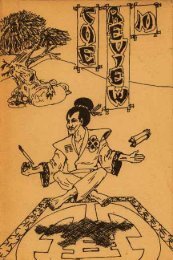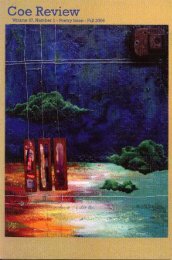You also want an ePaper? Increase the reach of your titles
YUMPU automatically turns print PDFs into web optimized ePapers that Google loves.
an acquaintance at work once complained that a machine had either lost<br />
or eaten a check he inserted into it, and that he had a devil of a time<br />
getting his bank to credit the money to his account. So on the basis of this<br />
secondhand testimony, Eugene convinced himself that ATMs could no<br />
longer be trusted to handle his financial transactions, and he had to carry<br />
them all out in person.<br />
If, after waiting in line, it was a different teller who signalled that she<br />
was ready for him, Eugene was tempted to step back so the next person<br />
could go to the window in his place. What he should do, he thought,<br />
was smile and indicate that he was waiting until Norma was free. But he<br />
never did that, because he knew it would be too obvious, and when he<br />
did finally get to Norma's window he would have to come up with some<br />
explanation for picking her out. If Norma was not at any of the windows,<br />
Eugene would leave without conducting his business and save it for after<br />
lunch or the next day.<br />
He timed most of his trips to the bank around the lunch hour, and<br />
after depositing a check or withdrawing ten dollars, he went to a nearby<br />
restaurant to eat. He took a table facing the door, and he fantasized Norma<br />
coming in over her own lunch break. She would recognize Eugene at once<br />
and stride straight to his table, and in a shy voice ask if she might join him.<br />
Eugene would gesture to the seat across from him and say, "Of course, I'd<br />
welcome the company." They would order together, as if the assignation<br />
had been planned, and at the end of the meal Eugene would insist on<br />
settling the bill.<br />
It occurred to Eugene that Norma knew a lot more about him than<br />
he did about her—or at least she knew if she cared to know, since she had<br />
access to so much information. It would all be on her computer screen,<br />
every time she called up his account. She would know his full name, for<br />
example, whereas he only knew NORMA. She would know that he was<br />
married, or at least that he shared his bank accounts with someone named<br />
Sharon Gechter.<br />
She would know how much money he had in savings and how much<br />
he kept in checking, and what his bi-weekly paycheck came to, and how<br />
many certificates of deposit he had and what their values were and when<br />
they were due to be renewed or cashed out. She would know that he had<br />
a safe deposit box, although presumably she would not know what was<br />
inside it—he imagined her wondering: is that where they kept his wife's<br />
jewelry? their stock certificates? the title to their house? their passports?<br />
She would know his social security number, his address, his telephone<br />
number, his credit card number, and the names of his children, who were<br />
listed on the account as beneficiaries. But Eugene didn't mind that Norma<br />
2 Roman Norma of the Manor






